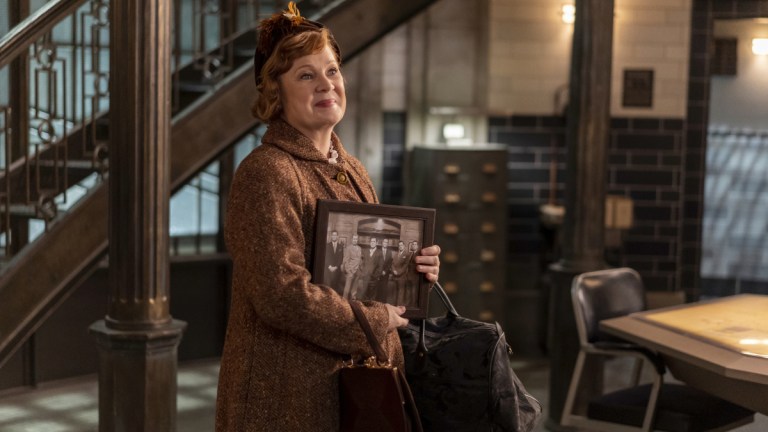Supernatural Gets Its First Wood Nymph
The final season of Supernatural heads off to the woods to find a new mythological creature in the form of Mrs. Butters.

This article contains spoilers for Supernatural season 15 episode 14 “Last Holiday.”
If you’re a fan of fantasy, you’ve probably heard of a wood nymph, or Dryad, before. Many of us will have first met them in C.S. Lewis’ Chronicles of Narnia, where they appear as the female spirits of the trees, but their history goes back much further than that, to Greek mythology.
There are lots of nymphs in Greek mythology; they’re minor deities associated with different parts of nature. They look after everything from wells, lakes, and springs, to beaches, pastures, and cooling breezes. Water nymphs of various kinds were called Naiads, and nymphs associated with woods and trees were called Dryads, though any of them could be called simply Nymphs. Pretty much any type of tree could have a Dryad associated with it, but they were especially connected with oak trees. Oak trees were often thought of as sacred – the oldest oracle in ancient Greece, the Oracle of Zeus at Dodona, worked by having the priestesses listen to the sound of the wind in the sacred oak tree.
Dryads tend to make brief appearances in Greek and Roman poetry, often in groups. They sing at marriages, or mourn at funerals, and they dance in the woods. They’re all female, and the Roman poet Ovid described them as richly dressed and even more richly beautiful in his poem Metamorphoses.
All of this sounds quite different from Mrs. Butters’ lifestyle and appearance in Supernatural! Mrs Butters is an attractive lady, but a fair bit older than most Greeks and Romans tended to imagine Nymphs (who are immortal and ageless). Her clothing is nice enough, but warm, sensible 1950s woollens probably isn’t what Ovid had in mind when he described them as “richly dressed”. She doesn’t tend to dance or sing much, and strangest of all, she’s nowhere near a wood or trees of any kind.
Mrs. Butters does have some things in common with her ancient forebears, though. She may not dance and sing like a Narnian Dryad, but she does love to party. Her time with the Winchesters is mostly spent celebrating every festival and special occasion they can think of to celebrate, one after the other. That’s a thoroughly suitable job for an ancient wood nymph. Being outside the city, in the wild, wood nymphs were associated with nature, and that meant wildness, and that meant partying. They usually hung out with the satyr-god Pan, the extremely well-endowed god who invented Pan pipes, and sometimes with Dionysus, the god of wine, theatre, parties, ecstasy, and wildness.
By throwing parties all the time, Mrs. Butters brings a bit of wildness and a party atmosphere to the bunker. She does it in a very different way to an ancient wood nymph, though. Mrs. Butters is, in many ways, the exact opposite of an ancient wood nymph. She’s like a fantasy of motherhood – middle-aged, smartly dressed, spending all her time cooking for the boys in the kitchen, sending them out with packed lunches while she stays home and cleans. It’s no wonder she misses her forest, where in her natural habitat she’d be chilling out in a Bacchic orgy (sex optional), drinking wine, making music, and dancing among the trees all night long.
The main trait Mrs. Butters seems to share with her more natural Dryad cousins is her fierce protectiveness of her home and family. The Hesperides, who guarded the golden apples belonging to the goddess Hera, were Nymphs of the evening and of sunsets, but they were sometimes also thought of as Dryads of the apple trees, and they were fiercely protective of the golden apples on the trees they guarded, alongside a terrifying serpent. Hercules once killed the serpent and stole the apples, but they were able to get them back in the end, and they guarded other treasures, too.
Other Dryads sometimes lived in secretive woodland groves and were justifiably afraid of anything that threatened the woods’ destruction. The Greek poet Nonnus, in his poem Dionysiaca, described the terrified prayer of a Dryad whose woods were being cut down to build ships, and who was desperate not to be sent to inhabit a myrrh-tree (myrrh being associated with death and mourning). So Mrs. Butters’ desperate desire to protect her home and her family makes sense, though it’s perhaps a bit surprising she’s not more concerned about what might have happened to her forest while she was away.
Ancient nymphs were often described as ‘haunting’ whatever area they belonged to, whether it was a river, a beach, or a woodland grove. Perhaps that’s where Mrs Butters has the most in common with them, as when she put herself on standby, she left herself to ‘haunt’ the bunker, unseen and unheard until the system was restarted. She’s a much more benevolent presence than most of Supernatural’s ghosts though – OK, so she tried to kill Jack and she tortured Sam and Dean a bit, but just about every character on the show has done that at one time or another, so she’s no worse than most!
